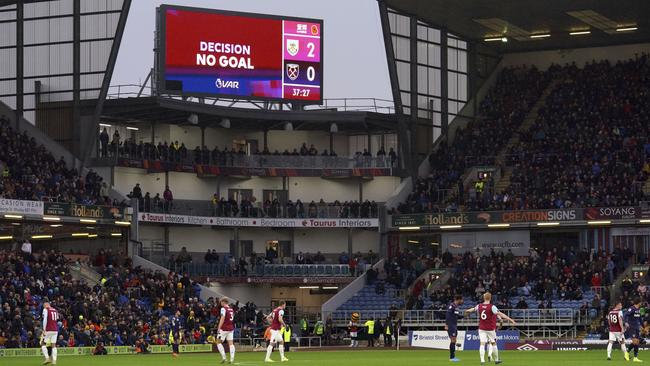‘The car crash that is VAR’
A group of EPL chiefs will demand changes to what one has described as “the car crash that is VAR”.

A group of English Premier League chiefs will demand changes to what one has described as “the car crash that is VAR” and raise the possibility of scrapping the technology mid-season.
The 20 clubs will meet Mike Riley, the head of referees, on Thursday, with a concerned group of chairmen and chief executives calling for answers over the inconsistent introduction of technology that they feel is damaging their league.
“Thursday will be a punchy and free discussion,” one leading chief executive said. “Is VAR improving the game? No. I do think some clubs will say we should scrap VAR now for the season. Someone will say VAR is making a laughing stock of the league.
“The chairmen I’ve spoken to want reform of the car crash that is VAR. We don’t just want tinkering.”
Riley, the general manager of the Professional Game Match Officials Board (PGMOL), is expected to resist recommending any significant change to VAR, despite growing pressure from clubs to allow referees to use pitch-side monitors.
Referees have effectively been told not to use the monitors but to leave it to the VARs based in Stockley Park in west London to overturn mistakes. That policy has come in for criticism from those who believes it undermines the authority of the on-pitch referee if he cannot check the decisions himself.
The main concern is the damage to the global reputation of the Premier League, with talk more focused on VAR than on the quality of the football being played. There is concern over the lack of communication to fans inside the stadiums.
Discussions will involve whether offside should focus only on players’ feet — rather than including parts of the body such as armpits, as when Raheem Sterling and Roberto Firmino had goals ruled out for Manchester City and Liverpool respectively – though that is determined by the International FA Board rather than the Premier League.
“VAR is affecting the game in the stadium and that’s a dangerous game to play,” the chief executive said. “I don’t know whether I can celebrate a goal or not. I’m a fan and before I would immediately look at the assistant to check for offside as I celebrated, now I’m waiting for someone at Stockley Park to tell me whether I can celebrate or not. That’s wrong.”
Confusion over the new handball interpretation has inflamed the situation, with the Premier League insisting on a more lenient approach for handball compared with other competitions.
Riley was singled out by the Manchester City manager Pep Guardiola after Liverpool’s Trent Alexander-Arnold was not penalised for a handball during City’s 3-1 defeat at Anfield on Sunday.
Guardiola said: “Ask Mike Riley and the big bosses about that. Don’t ask me. I’m here to talk about the game. Every time I’m asked why one day it’s handball, the next day it’s not. Ask them.”
Under the Ifab protocol, the use of the monitors is optional, and there has not been a single occasion that they have been used in the Premier League even though they are at all the top-flight grounds.
The chief executive of another Premier League club said that allowing referees to use the monitors could be a way to reduce the criticism of the VAR system.
“You can see the fans are turning against it now and that must be a worry,” he said. “The supporters in the stadium, as well as the players, want to know that the referee is having the final say, not someone several hundred miles away.”
The existing guidance says referees in the Premier League should only check the monitor for an incident that they have missed completely, such as an off-the-ball clash, or if the VAR’s opinion is markedly different to their own.
Neil Swarbrick, the man in charge of the VARs in the Stockley Park control centre, said that he believed the system had rated around seven out of ten in its first three months in operation.
“I’m really pleased with how we have started out,” Swarbrick told the BBC. “I’d give us around about seven-ish [out of ten]. We have more decisions correct with VAR than without it. If the mark now is seven, in two years’ time I’m hoping for eight-and-a-half or nine.
“We are open to evolving with this — it’s not a case of we’re not budging. We will listen to feedback and where we can improve things, we will do.”
Since VAR was introduced, the PGMOL has recorded the accuracy of decision-making on goals, red cards and penalties as rising from 82 per cent last season to above 90 per cent.
THE TIMES


